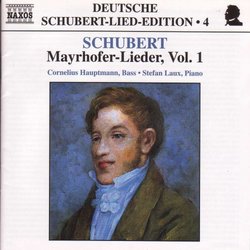| All Artists: Franz [Vienna] Schubert, Stefan Laux Title: Schubert: Mayrhofer-Lieder, Vol.1 Members Wishing: 0 Total Copies: 0 Label: Naxos Original Release Date: 1/1/2000 Re-Release Date: 4/11/2000 Genres: Pop, Classical Styles: Vocal Pop, Opera & Classical Vocal Number of Discs: 1 SwapaCD Credits: 1 UPC: 636943473825 |
Search - Franz [Vienna] Schubert, Stefan Laux :: Schubert: Mayrhofer-Lieder, Vol.1
 | Franz [Vienna] Schubert, Stefan Laux Schubert: Mayrhofer-Lieder, Vol.1 Genres: Pop, Classical
|
Larger Image |
CD Details |
CD ReviewsExploring the Schubert Songs -- Mayrhofer-Lieder vol. 1 Robin Friedman | Washington, D.C. United States | 12/27/2004 (4 out of 5 stars) "This CD is a companion to another collection of Scubert's Mayrhofer lieder on Naxos titled simply, "Mayrhofer -Lieder volume 2" featuring Christiane Iven, Mezzo-soprano and Burkhard Kehring, Piano. That disk includes 15 Schubert songs set to poetry by Mayrhofer while this disk, "Mayrhofer volume - 1" includes 25 songs performed by bass Cornelius Hampton and pianist Stefan Laux. Together, these CDs are an excellent way to explore these songs.
Franz Schubert set 47 poems of his friend, Johann Mayrhofer (1787 --1836) to song. When Schubert turned 18, he left home and lived with Mayrhofer for two years in a shabby rooming house. Mayrhofer was a political liberal with the uncongenial job of serving as a literary censor for the Austro-Hungarian empire. His own poetry served as a means of veiling the tension between his job and himself. Mayrhofer comitted suicide in 1836. Of the 25 Mayrhofer poems on this CD, nine involve settings of Greek myths and legends. The song I most enjoyed of this group was "Memmon" D. 541, which I hadn't heard before. This four-stanza song begins slowly and lyrically and builds to a moment of great intensity in the third stanza, as Scubert, Mayrhofer and Memmon combine to state a credo of the artist achieving transcendence of suffering through song. Many of the other songs with classical themes are declamatory in style, almost as though they were part of an operatic recitif rather than a lied. These songs include "The Fragment from Aechylus", D.450, the two songs based upon the Orestes legend, , D. 699 and D. 548, "Philoctetes", D.540, and "Voluntary Extinction" D.700. These songs will show the listener familiar only with the simple lyrics of Schubert a new side to the composer, as will the two ambitious "Heliopolis" settings, D.753 and D.754 included on this CD. The songs on this CD include a drinking song "To Punch" D. 492 and a hunting song, "The Hunstsman of the Alps" D.524, but otherwise Mayrhofer's non-classical settings are noted for their obscurity. They are veiled autobiography tending to express either his disatisfaction with his job as a censor or, perhaps, a more personal, sexual aspect of his life that he felt compelled to repress. The most famous of these songs is "Nachtviolen" (dame violet) D. 752, set intensely to a simple repeating figure in the upper register of the piano. Many people hear this song, in Schubert's beautiful setting, as a picture of hidden and frustrated sexual needs. It is one of the deepest and most enigmatic of Schubert's lieder and has long been a favorite of mine. The performance here is good but does not plumb the depths of this song. Other songs on this CD that will reward repeated listening include "To my friends" D. 654 with its opening walking bass figure which describes how the poet hopes to be remembered after his death; the "End of a Song", D.473, a ballad on the power of music and poetry; "The Shepherd" D. 490, full of the passion of lost love; "On the Danube" D. 553, and "The Boatman" D. 536, two water songs highly different from each other; "Old Love Never Tarnishes" D. 477, a song as melodic and lyrical as its title suggests; "The Victory" D. 805 with its choral prelude and postlude and hymnlike theme; and "The Gondolier" D. 808, one of the last Mayrhofer settings. Bass Corneilius Hauptmann and Pianist Stefan Laux perform capably and more than well. But in some instances, as with "Nachtviolen", I didn't think they captured fully the tension and the passion that lies just beneath the surface of many of the Mayrhofer songs. This CD is part of a complete recording of the Schubert lieder on the budget-priced Naxos label. The strongest feature of this compilation, besides the low price, is that in allows the listener to gather together and explore in two CDs most of Schubert's settings of Mayrhofer's poems. (Schubert set more of his friend's poems than he did of any other writer except for Goethe and Schiller.) Many of these settings will be unfamilar to the listener who has heard only the Schubert songs frequently performed in basic collections. Scubert's Mayrhofer settings are themselves a substantial body of song-writing of various kinds that will delight and repay frequent hearings. This CD is an outstanding way for the lover of Schubert to explore the Mayrhofer songs in depth." |

 Track Listings (25) - Disc #1
Track Listings (25) - Disc #1